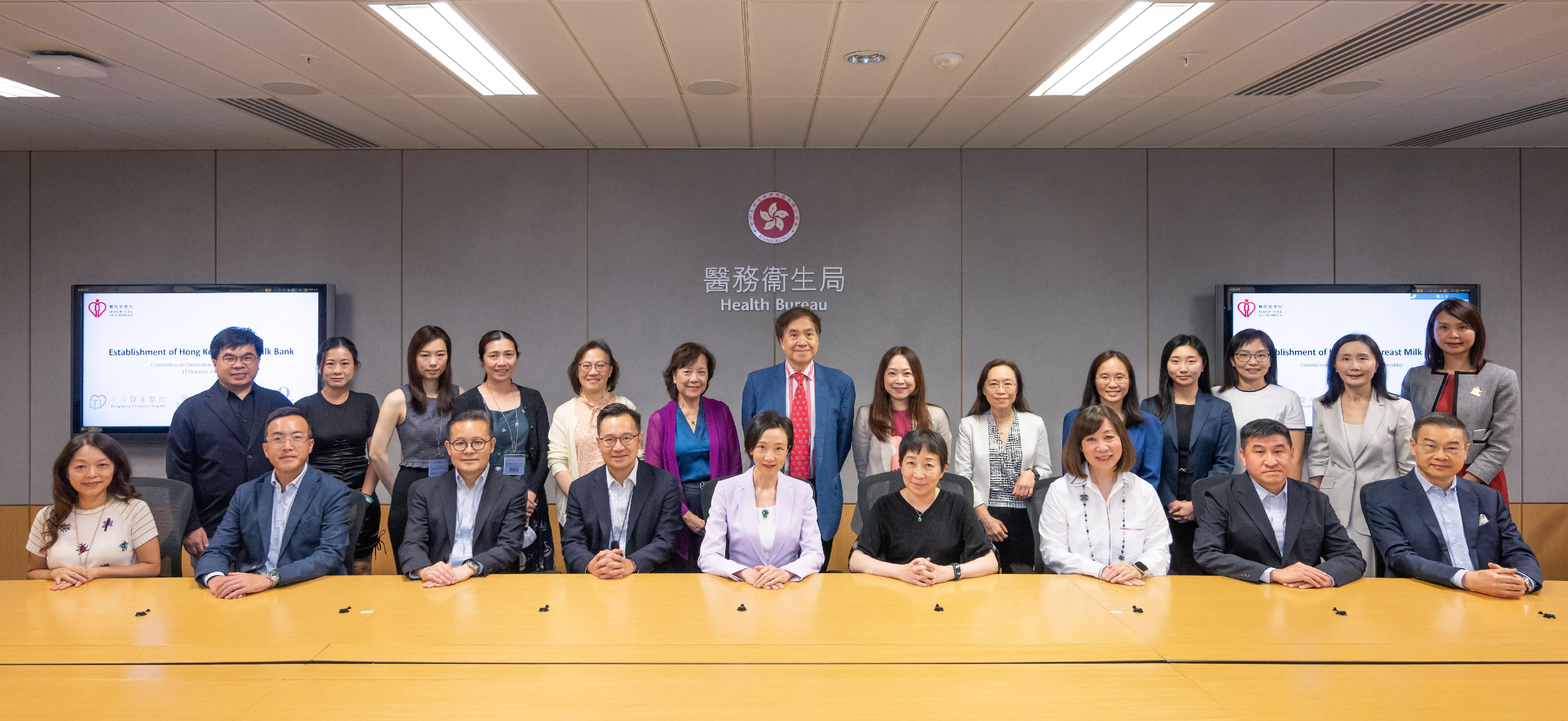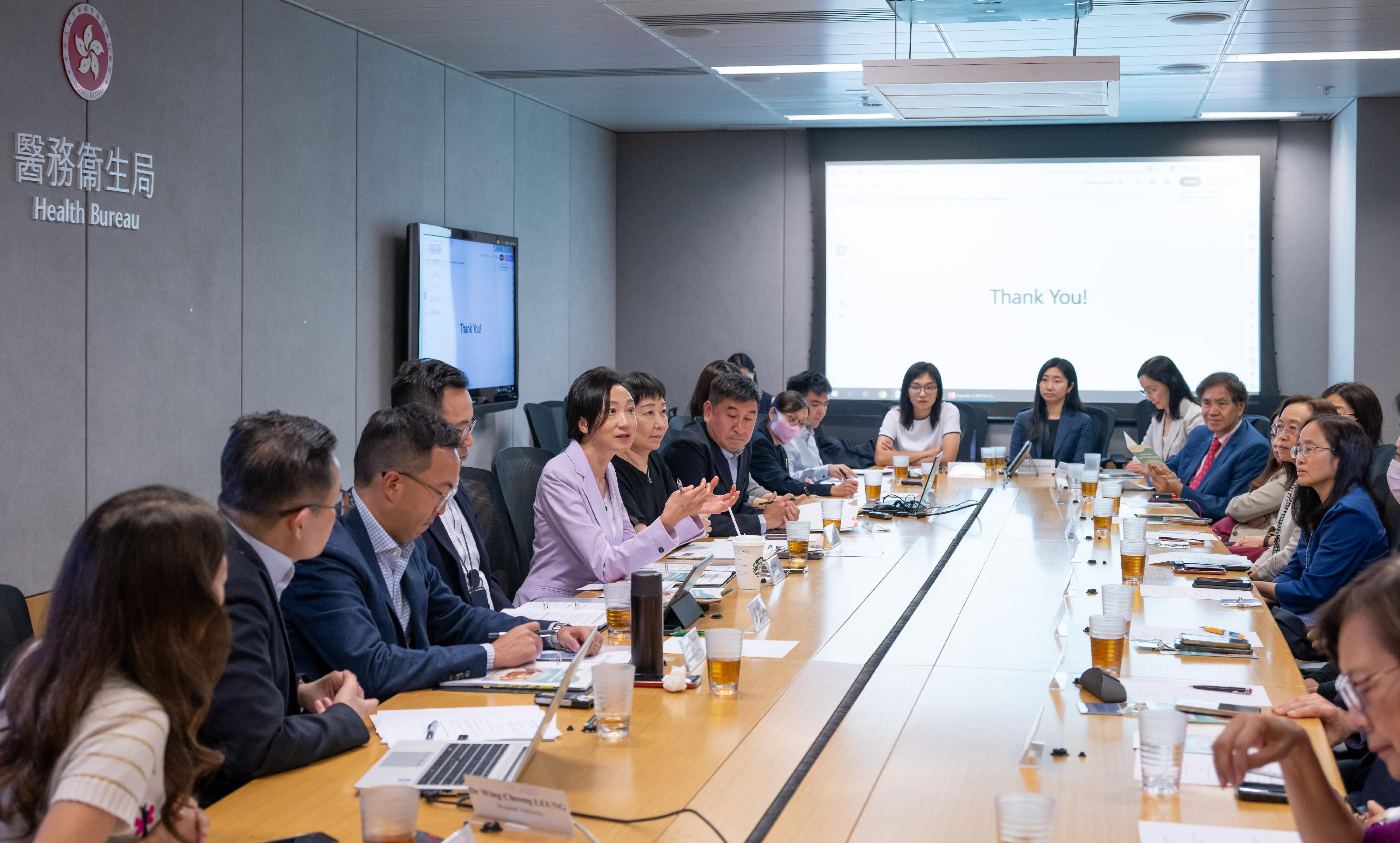Under Secretary for Health chairs 10th meeting of Committee on Promotion of Breastfeeding (with photos)
******************************************************************************************
At the meeting, representatives of the Department of Health (DH) reported to the Committee the local breastfeeding situation. Breastfeeding rates in Hong Kong have shown significant improvement over the past 25 years. Among others, the breastfeeding rate on hospital discharge reached 81 per cent in 2024, marking a substantial increase when compared to the 55 per cent in 2000. The rate of exclusive breastfeeding until 4 months of age also rose from 8 per cent in 2000 to 18 per cent in 2024. The above figures indicate the wide community support for breastfeeding, as well as the effectiveness of the Government's measures in promoting breastfeeding over the years. Nevertheless, the DH has noted a downward trend in local breastfeeding rates in recent years. Key contributing factors include insufficient self-efficacy and motivation among women to breastfeed, as well as discontinuation of breastfeeding due to work commitments. This reflects that support from partners, family, peers, workplaces, and communities, as well as fostering a breastfeeding-friendly environment and culture, are critical to promoting breastfeeding.
The first few hours and days after birth are critical for establishing lactation and success of breastfeeding, and the immediate skin-to-skin contact between mother and baby in the delivery suite is particularly important. According to scientific evidence, this helps breastmilk secretion and increases the chances of successful breastfeeding. To strengthen and consolidate the breastfeeding-friendly measures in maternity hospitals (including both public and private hospitals), the Government has specially set up a dedicated working group under the Committee, members of which include representatives from the accreditation body, namely the Baby Friendly Hospital Initiative Hong Kong Association, and local maternity hospitals. The Chairman of the working group reported on the work progress at the meeting, including the enhancement of the monitoring system for existing maternity hospitals in the middle of this year to more accurately capture breastfeeding data prior to infant discharge, as well as a detailed assessment and analysis of the implementation of breastfeeding-friendly measures in local maternity hospitals to be completed within this year. Based on this information, strategic recommendations will be provided as appropriate to enhance the implementation of baby-friendly measures.
In addition, the HKBMB located at the Hong Kong Children's Hospital has officially commenced operations since this January to provide breastmilk for infants and young children who cannot be breastfed by their biological mothers, thereby minimising the chance of serious illness in premature or severely ill babies. Since this March, the HKBMB has supplied processed donated breastmilk to nine public hospitals in Hong Kong equipped with neonatal intensive care units (NICUs). As of October 6 this year, the HKBMB had registered 368 breastmilk donors and collected over 2 013 litres of breastmilk to be supplied to extremely premature and critically ill newborns, providing the best possible nutrition. Meanwhile, public hospital NICUs have distributed processed donated breastmilk to 309 infants with clinical needs.
Moreover, the Committee has proposed two main strategic directions on the promotion, protection and support for breastfeeding based on local circumstances, namely (1) strengthening and consolidating professional support from healthcare institutions, and (2) enhancing support for breastfeeding mothers from various sectors.
Regarding professional support from healthcare institutions, at present, all eight public hospitals with obstetrics departments are accredited Baby-Friendly Hospitals (BFHs). Two private hospitals offering delivery services have activated the accreditation procedures, with one already accredited. Of the 29 Maternal and Child Health Centres (MCHCs) currently providing services under the DH, 15 of them have been accredited as Baby-Friendly MCHCs, with others expected to be accredited gradually starting from next year. The Government will continue to promote breastfeeding-friendly measures in local maternity hospitals and encourages more private hospitals to participate in the BFHs accreditation through the aforementioned dedicated working group.
As regards to strengthening support for breastfeeding mothers from various sectors, the Government has long been committed to creating a breastfeeding-friendly environment. Apart from the amendments made to the Sex Discrimination Ordinance to prohibit discrimination against and harassment towards breastfeeding women, and the extension of statutory maternity leave from 10 to 14 weeks, the Government also mandated the provision of baby-care and breastfeeding facilities in newly built government premises for public and staff members' use since early 2019. Moreover, since 2017, the Government has included detailed requirements, including the area and number of baby-care rooms and/or lactation rooms that shall be provided in the commercial development projects, in the Conditions of Sale of new commercial land sale sites (excluding land designated for hotel use only). The Government also encourages more enterprises to implement a Breastfeeding Friendly Workplace policy to enable working mothers to continue breastfeeding after returning to work. The DH issued relevant guidelines for employers and employees with specific advice on supporting breastfeeding.
Dr Fan said, "Breast milk is the most ideal food for infants. It is safe, clean, and contains antibodies which can help prevent many common childhood illnesses. Protecting breastfeeding is a collective responsibility of the entire society. A mother being able to continue breastfeeding relies on collaboration and support from all sectors of the community. I call upon all sectors of the community to attach great importance to breastfeeding and work together to provide support on all fronts to foster a friendly environment and atmosphere. The Government will continue to promote and support breastfeeding with dedicated efforts, and collaborate with all sectors of the community to increase the sustainability of breastfeeding and enhance the overall maternal and child health."
Established in April 2014, the Committee comprises members from relevant healthcare professions and academia as well as representatives of organisations promoting breastfeeding. The Committee is responsible for providing recommendations on the strategies and action plans for further strengthening the promotion, protection and support for breastfeeding as well as overseeing the relevant progress, with a view to enhancing the sustainability of breastfeeding and advocating breastfeeding as the mainstream baby-care mode to be widely accepted by the general public.
Ends/Friday, October 17, 2025
Issued at HKT 18:48
Issued at HKT 18:48
NNNN






